I once read a book which depicted hell as being different for each and every person. According to the author, every individual has a special version of hell specifically designed around his/her deepest fears and anxieties.
I couldn’t help but wonder what my customized hell would be like. And as I ran down my list of phobias (birds and fish…shudder), I realized that my fear of objects is nothing compared to my fears of certain situations.
Like many others, I suffer greatly from the first and greatest sin: pride. Add this to the fact that I was often teased and bullied as a child — if not altogether excluded or ignored — and my own version of hell would be obvious. Mockery. Humiliation. Shame. Feeling left out.
Perhaps a circle of the people in my life, with me at the center, while they tease me, laugh at me, and spit insults at me? For all eternity?
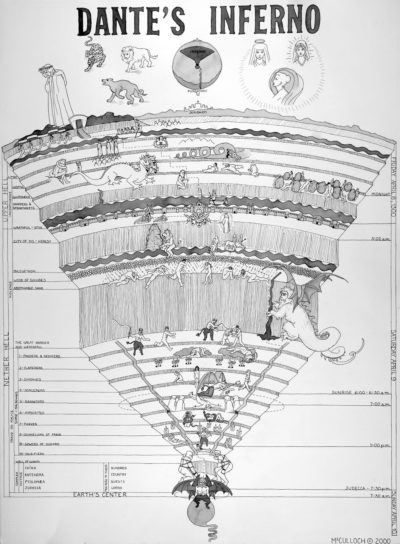
(image source)
As Claire continues to grow and mature, it is becoming apparent that she takes much of her personality after me — her sensitivity to her surroundings, in particular.
But these days, I am afraid that I may have passed down my deepest fears as well.
I have read that most children begin to experience embarrassment between the ages of 15-24 months. Claire, having always been emotionally advanced for her age, started exhibiting signs of self-consciousness right after she turned one. There was a period of time when we, as adults, had to be extra careful when faced with funny stories or situations, because whenever everyone in the room started laughing, Claire would get upset because she was afraid we were laughing at her!
As she gradually grew out of this phase, we began to witness a different reaction. For the past few months, whenever everyone starts laughing, she will stop whatever she was doing and laugh loudly too. Most of the time, it is painfully obvious that she has no idea what everyone else is laughing about — she was either distracted or not paying attention to what was going on — and this forced laugh just sounds fake.
It is indisputable that she only laughs along because she wants to feel included.
As parents, we all want the best for our children. We hope and wish that they will only take after the best facets of ourselves, that the things we despise most about ourselves will become lost and eventually disappear from our family’s gene pool.
Perhaps this aspect of Claire’s personality will change as she grows older. But for now, I can’t help but feel at least a bit guilty that my young daughter, who is only still a toddler, is already experiencing emotions of self-consciousness and potential shame.
Because now, my own version of hell includes my children alongside me at the center of the circle of humiliation.

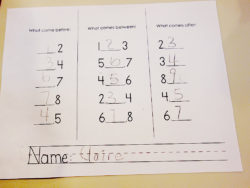
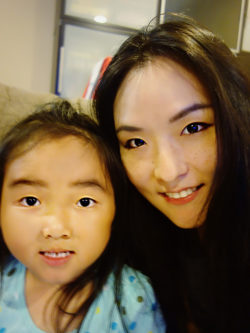
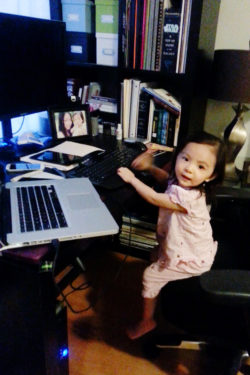
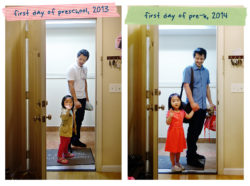

 I like books, gadgets, spicy food, and art. I dislike shopping, hot weather, and the laws of entropy. Although I am a self-proclaimed computer nerd, I still have a love for handbags and makeup... and I am always teetering on high heels. To learn more about me, visit the
I like books, gadgets, spicy food, and art. I dislike shopping, hot weather, and the laws of entropy. Although I am a self-proclaimed computer nerd, I still have a love for handbags and makeup... and I am always teetering on high heels. To learn more about me, visit the 
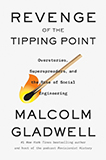

I think you may be projecting to a fairly ridiculous degree. Lots of children laugh along with people.
Perhaps I wasn’t being too clear. Of course she laughs along with adults when something funny happens in front of all of us. I’m talking more about her clearly being outside, say, a circle of conversationalists, and when they laugh, she will run in to include herself in that circle and laugh. And it is obvious to everyone that she has no idea what is funny — she’s just laughing because everyone else is, and you can see her eyes flicker back and forth between others’ faces for more clues as to how she should proceed. She has been doing this from the time she was about 1.5 years old.
I was the same way as a child, and my mother would always tell me to stop being so self-conscious. As I grew older, I understood that my self-consciousness did come from my mother. She encouraged me to do more activities that would put me in vulnerable situations, where I wouldn’t be the best, so that I could learn that it didn’t matter what other people thought. I really do think that helped because I feel much more confident now than my mother ever does on a daily basis. And I find myself often helping her feel better about herself and reminding her not to care what other people think. I’m sure my words fall on deaf ears, but I hope that my children do even better than I have done. I admit to still feeling self-conscious a lot, but not voicing it as much as I used to, and remembering that the people whose opinions matter will never shun me for a decision I’ve made.
I think that the more you accept this “hell” as a reality, the more it is possible that it will become real. You’re a wonderful mom, despite Claire’s inherent personality traits, I think as she gets older, you will be able to teach her how to get over these fears and feelings. 😛
Your version of hell is similar to mine as I’m also very self-conscious and have realized I’ve always been like that too. Because you can recognize this in her, I think you can address it and help her deal with it when she’s older. You can help her recognize this emotion in herself and tell her that it’s okay and not shameful to have this emotion. I think that’ll be helpful for her emotional well being 🙂 Btw, was the book No Exit?